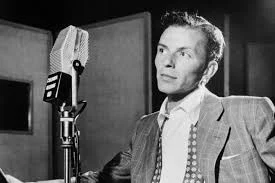In her book Real Men Don’t Sing: Crooning in American Culture (Duke University Press), author Allison McCracken posits that white male singers in the Jazz Age turned the social order of the day on its head by covertly challenging the existing hyper-masculine norms of guy behavior. These crooners “showed an unseemly degree of ardent emotion and vulnerability for white men, and they used microphones and amplifiers to enhance their soft, trembling, often sensually breathy sounds,” she writes. Male crooners wouldn’t have been a problem were they just a passing phase in American popular culture. But the rapid rise of home radios from 1920 onward allowed for private listening to these seductive male voices—and women loved them. To distraction. Hence the problem. McCracken contends that a groundswell of female fans made these jazz crooners the first pop idols ever, disrupting long-held notions of how men should relate to women and demonstrating just how socially transformative music can be.
While McCracken’s book presents a case for how the singing voice transmits and sometimes upends social signifiers (race, class, gender, etc.), it also whispers the message that these things shouldn’t matter to begin with. Clearly, some here in America would take issue with this position. But perhaps we can all agree on this: The U.S. has given the world some superlative male vocalists.
Grammy-winner Kurt Elling certainly qualifies as one of these. More than two decades into his career, Elling continues to define what jazz singing is and where it’s going. With his most recent release, The Beautiful Day—Kurt Elling Sings Christmas (OKeh/Sony Music Masterworks), Elling set out to make a secular Christmas album that captures the reverence of the holiday (for some) without triggering any unhappy associations (for others). In delivering this tall order, Elling relies on the sheer power of his magnificent voice, the artful arrangements that defy stereotypes of holiday music, and a humility that befits the season. “The human capacity for quiet transcendence, born within each of us, is a concept that…ought to resonate for people of every faith tradition,” writes jazz critic Neil Tesser in the liner notes. Even those without a faith tradition can appreciate the quiet transcendence of tunes like “The Michigan Farm (Cradle Song, Op. 41/1),” a contemporary setting of Edvard Grieg’s haunting lullaby featuring Elling’s own lyrics, and the medley “The Snow Is Deep On The Ground/Snowfall” by John Hollenbeck/Kenneth Patchen and Claude/Ruth Thornhill, respectively. Christmas is a dark time of year, Elling is quoted as saying, a time of pondering mysteries. This album can help with that.
Singer Kenny Washington recorded Moanin’: Live at Jazzhaus Montmartre Copenhagen (Storyville) a little over a year ago. This new recording gives the listener a mere glimpse into Washington’s enormous talent: just five tunes, each one a nonpareil. First up is the title track, a soul-charged gospel take on the Art Blakey hit. Next is “What Is This Thing Called Love,” full of engagingly dexterous scatting and littered with direct Ella references. Then “I Got It Bad And That Ain’t Good,” a fervid ballad that would give the best of the crooners pause, and “Sitting On The Dock Of The Bay,” an R&B marvel that concludes with a virtuosic whistling solo. But for the final tune—just when you’re wondering if Washington can launch rockets with his voice—he sings “Do You Know What It Means To Miss New Orleans” as simple and smooth as a warm brandy. It slays. Washington and Wynton Marsalis—both New Orleans natives—will perform in “Home For The Holidays” at JALC Dizzy’s on Dec. 9-11.
Two bona fide crooners and regular fixtures on the New York vocal jazz scene will be offering yearend tidings of goodwill: Freddy Cole celebrates the holiday with his quartet at Birdland on Dec. 20-24, and Marcus Goldhaber presents “Mostly Marcus,” his regular duo-plus-guest-vocalist gig, at Symphony Space’s Bar Thalia on Dec. 4 and 11.
Breaking news: Judi Silvano and Bruce Arnold just dropped their latest recording, Listen To This (s/p), without much fanfare or advance notice. “It’s a spur-of-the-moment release,” Silvano says. “We finished recording it and thought, why not release it digitally? Does anyone release CDs anymore anyway?” An oft-heard question these days. The project pairs Silvano’s signature vocal improvs with Arnold’s expansive explorations on electric guitar. For digital downloads of one or more tracks, visit muse-eek.com.
(Reprinted from the December 2016 issue of The New York City Jazz Record.)
